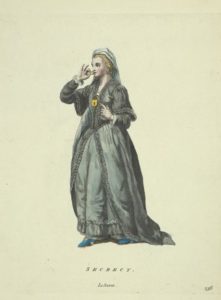
15 May What is “privilege”?
No, I don’t mean the social “privilege” we all enjoy as interpreters or translators because of the education, general knowledge and specialized skills that give us a certain advantage over others a bit less fortunate. No, I mean the sort of privilege we are supposed to maintain and protect as part of our ethical duties.
Canon 3. Confidentiality – Privileged or confidential information acquired in the course of interpreting or preparing a translation shall not be disclosed by the interpreter without authorization.[1]
Privileged and confidential information are not the same thing and cannot be treated the same way by interpreters and translators. Privileged information in the legal interpreting and translation world comes from the privileged communications that take place between an attorney and a client. There are other types of privileged communications, such as the ones between a married couple, but they all derive from the Fifth Amendment right against forced self-incrimination.[2] “In more technical terms, privilege is a legal doctrine under which certain communications, made within the context of certain relationships, will be sheltered from disclosure to any other persons.”[3]
As a Constitutional right, privilege is something that only the client, i.e., a criminal defendant, can waive. No court can force a defendant or his/her attorney to disclose information exchanged in the context of an attorney-client communication, with very few exceptions. One would be when the wellbeing of a child is in danger; another one would be when the client communicates to his or her attorney an imminent and credible plan or intention to commit a crime.[4]
Whereas the privilege is meant to allow a client to disclose all the information an attorney may need to prepare a defense in a criminal case, the information is protected from disclosure only when no third-party is present to hear it. The courts established very early on that the privilege attaches to the interpreter, as long as the interpreter is acting to facilitate communication within the confines of the attorney’s professional business. “The privilege of not disclosing a communication made by a client to counsel is confined to counsel and to an interpreter . . . .” Jackson ex dem. Haverly v. French, 1829 WL 2449 (N.Y. Sup. Ct. 1829). The privilege does not cover communications unrelated to the client’s case or attorney communications about the client’s case with anyone other than the client.
 In an 1859 case, “[a] communication was made by a client to an attorney, in the office of the latter, which was in his dwelling-house, and in the presence of a son of the attorney . . . who had no connection with the professional business of his father.” Goddard v. Gardner, 28 Conn. 172 (Conn. 1859). While the Supreme Court of Errors of Connecticut—as the court was called at that time—made it clear, on the one hand, that the son in that case was not covered by the privilege, it also made it clear, on the other hand, that: “The rule also, like the reason of it, extends to interpreters, and to clerks and agents employed by the attorney, &c. in the business committed to his charge, but extends no further.” Goddard, 28 Conn. at 175. That same year, the Supreme Court of Iowa also addressed the rule, and again mentioned interpreters: “the rule ‘is confined strictly to communications to members of the legal profession, as barristers, and counselors, attorneys and solicitors,’ [cite omitted] and those whose intervention is necessary to facilitate the communication between attorney and client, as interpreters. . .” Sample v. Frost, 10 Iowa 266 (1859).
In an 1859 case, “[a] communication was made by a client to an attorney, in the office of the latter, which was in his dwelling-house, and in the presence of a son of the attorney . . . who had no connection with the professional business of his father.” Goddard v. Gardner, 28 Conn. 172 (Conn. 1859). While the Supreme Court of Errors of Connecticut—as the court was called at that time—made it clear, on the one hand, that the son in that case was not covered by the privilege, it also made it clear, on the other hand, that: “The rule also, like the reason of it, extends to interpreters, and to clerks and agents employed by the attorney, &c. in the business committed to his charge, but extends no further.” Goddard, 28 Conn. at 175. That same year, the Supreme Court of Iowa also addressed the rule, and again mentioned interpreters: “the rule ‘is confined strictly to communications to members of the legal profession, as barristers, and counselors, attorneys and solicitors,’ [cite omitted] and those whose intervention is necessary to facilitate the communication between attorney and client, as interpreters. . .” Sample v. Frost, 10 Iowa 266 (1859).
In a much more recent case, the defendant spoke in Spanish directly to the court-appointed interpreter, threatening to kill the prosecutor. After a jury trial in which he was found guilty, the court imposed sentence and the defendant appealed. The Texas Court of Appeals had to consider whether the threat communicated by the appellant directly to the court-appointed interpreter was confidential and protected by the attorney-client privilege. Aviles v. State, 165 S.W.3d 437 (Tex. App. 2005). Appellant Aviles argued that the interpreter was acting as his agent or his attorney’s agent, so the attorney-client privilege prohibited the interpreter from disclosing the communication. But since the communication was not “in furtherance of the rendition of professional legal services to the client or those reasonably necessary for the transmission of the communication,” the court ruled that it was not protected by the Fifth Amendment privilege against self-incrimination. Id. at 439.
Confidential communications, on the other hand, are not a protected right under the Constitution and are subject to different rules. Confidential information is meant to be kept secret[5] and there is an implied promise by the interpreter or translator to keep and safeguard the client’s secrets or other private information learned during the course of our work. During an interpreted event or in the course of translating a legal document, we can become privy to facts or knowledge that are not in the public domain, and it is our ethical duty not to misuse the knowledge or facts for our own advantage or benefit. Disclosure of confidential information, however, can be compelled by a judge if it serves the interests of justice, which is a much lower threshold than the knowing and willful waiver of a constitutional right. As a matter of fact, it recently came to light that Space-X had signed Non-Disclosure Agreements (NDAs) with the University of Texas Rio Grande Valley (UT-RGV), the Brownsville Public Utilities Board (BPUB), and Cameron County. The Texas Office of the Attorney General has ordered the release of the NDAs.[6]
To summarize: privileged communication emanates from the Fifth Amendment right against self-incrimination that protects criminal defendants, and by extension covers attorney-client exchanges of information. That privilege, in turn, attaches to the interpreter but only while facilitating communication between attorney and client as may be necessary for the attorney to counsel the client.[7] The privilege belongs to the defendant and only he or she can waive it. No one can compel the disclosure of privileged communications, with very few and rare exceptions.
Confidential communication arises when there are secrets that the interpreter or translator may learn during the course of their professional work, or information that is not available to the general public, which the interpreter or translator may neither disclose nor use to benefit from it in any way. However, that information may be subject to discovery in certain cases or may have to be disclosed upon an order from a judicial authority.
Both privileged and confidential communications are also to be differentiated from the secret nature of grand jury proceedings. Only witnesses may disclose their testimony before a grand jury. “The law provides that the proceedings before a Grand Jury be conducted in secret. The only individuals who may be present while testimony is being given are members of the Grand Jury, attorneys for the government, the testifying witness, an interpreter when needed, and a court reporter to record the testimony.”[8] Based on the same principle for privileged attorney-client communication, the grand jury’s secrecy rule “does not impose any obligation of secrecy on witnesses. The existing practice on this point varies among the districts. The seal of secrecy on witnesses seems an unnecessary hardship and may lead to injustice if a witness is not permitted to make a disclosure to counsel or to an associate.”[9]
I would like to see our Code of Ethics updated to include better definitions of these concepts. I believe many questions interpreters and translators have on just this one ethical principle could be easily clarified if we could “fine tune” the Code. What are your thoughts on this?
[1] NAJIT Code of Ethics and Professional Responsibilities. (Last visited on Apr. 25, 2023) https://najit.org/wp-content/uploads/2016/09/NAJITCodeofEthicsFINAL.pdf.
[2] “No person . . . shall be compelled in any criminal case to be a witness against himself . . . .” Fifth Amendment, Overview. Legal Information Institute, Cornell University. (Last visited on April 26, 2023) https://www.law.cornell.edu/wex/fifth_amendment#:~:text=A%20right%20against%20forced%20self,market%20value%20of%20the%20property.
[3] Libby, Michael. Privilege: when are communications confidential? (May 2014, Updated April 2018). https://dolden.com/privilege-when-are-communications-confidential.
[4] “[C]ommunications made to an attorney for the purposes of furthering a crime are not entitled to this privilege. Attorney-Client Privilege, Legal Information Institute, Cornell Law School. (Last visited on Apr. 27, 2023.) https://www.law.cornell.edu/wex/attorney-client_privilege.
[5] Black’s Law Dictionary (11th ed. 2019).
[6] Sheridan, Erin. Rio Grande Valley groups fight to keep SpaceX non-disclosure agreements private. Texas Public Radio. April 24, 2023 at 2:21 PM. https://www.tpr.org/technology-entrepreneurship/2023-04-24/spacex-nda-foia-rgv-brownsville-cameron-county-bpub-utrgv.
[7] The privilege may not attach to the translator since the act of translating a document may not be a direct “facilitation of communication” between the attorney and the client.
[8] Grand Jury Witness Information. United States Attorney’s Office, Western District of Washington, U.S. Department of Justice. Last visited on Apr. 29, 2023. https://www.justice.gov/usao-wdwa/victim-witness/witness-info/grand-jury.
[9] Federal Rules of Criminal Procedure. Rule 6. The Grand Jury. Legal Information Institute. Cornell Law School. Last visited on Apr. 29, 2023. https://www.law.cornell.edu/rules/frcrmp/rule_6.

Janis Palma has been a federally certified English<>Spanish judiciary interpreter since 1981. Her experience includes conference work in the private sector and seminar interpreting for the U.S. State Department. She has been a consultant for various higher education institutions, professional associations, and government agencies on judiciary interpreting and translating issues. She worked as an independent contractor for over twenty years in federal, state, and immigration courts around the U.S. before taking a full-time job. Janis joined the U.S. District Courts in Puerto Rico as a staff interpreter in April 2002 and retired in 2017. She now lives in San Antonio, Texas, embracing the joys of being a grandmother. She also enjoys volunteering for her professional associations, has been on the SSTI and TAJIT Boards, and is currently the past Chair of the NAJIT Board of Directors. Contact: palmajanis88@gmail.com
Main photo (cropped) taken from Chapter 1.2 “THE COMMUNICATION PROCESS” from the e-book An Introduction to Speech Communication by Christopher Miller and Mia Poston (ed. College of DuPage Digital Press), under the CC BY-NC-SA 4.0 license. Body photo “Secrecy. Le Secret.” by Cesare Ripa (1560-1645), originally published in 1608 in L’Iconologie ou la science des emblems devises, etc. enrichie & augmentée d’un grand nombre de digures avec des moralités, tirée la plupart de Cesar Ripa. Image downloaded from the New York Public Library Digital Collections. Believed by the NYPL to be in the public domain.

Privileged information can also come from other relationships– such as doctor– patient, tax preparer or enrolled agent and client, psychologist– patient, etc. It does not necessarily have to involve a criminal matter. It always comes from the relationship and the expectation of privacy. The expectation is that the information will only be used by the parties permitted to receive the information.
This explains the necessity of the injured worker signing the permission for the doctors to release the information to the attorneys, insurance companies and/or judge.
You are absolutely right, Sylvia. I did not include every single instance of privileged communication because I was addressing the judiciary interpreters’ code of ethics, which is applicable primarily to attorney-client communications. Should an interpreter be called upon to mediate between spouses, a doctor or psychiatrist or psychologist and a patient, a tax preparer and a client, etc., and there is a privilege that protects those communications, the same principles would apply: the privilege belongs to the person that is protected by law and can only be waived by that person, not the interpreter.
This is an excellent topic and merits at a minimum an entire Ethics CE class. Thank you Janis
Thank you, Konnie! I like your idea of an entire class for CE credits. Maybe at the next TAJIT conference? We’ll see.
Rhode Island interpreters are currently dealing with this issue in the General Assembly. Bill H 5906 states that language interpreters shall not be called upon to testify “unless compelled by court order.”
In contrast, current laws governing confidentiality and privilege for those who use American Sign Language interpreters and Court-Appointed Mediators are stronger because they do not contain exceptions the words “unless compelled by court order.”
The General Assembly will vote on the bill very soon. We hope to craft a bill in the future which does not include language about compelling interpreters to breach the Code of Ethics by testifying about information obtained in the course of our duties.
Hi Helen: I just read the bill and it is precisely what I tried to describe in my blog. Confidential communications are NOT privileged and may be subject to disclosure if so ordered by a judge or some other legal authority. I gave the example of the Texas Attorney General who was able to compel the disclosure of confidential NDAs between Space-X and the University of Texas Rio Grande Valley (UT-RGV), the Brownsville Public Utilities Board (BPUB), and Cameron County. This is why the code of ethics is confusing and needs to be revised. You are NOT violating or breaching the code of ethics if a judge orders you to disclose CONFIDENTIAL information. On the other hand, no judge could order you to disclose PRIVILEGED information because the privilege is not yours (or his/hers) to waive.